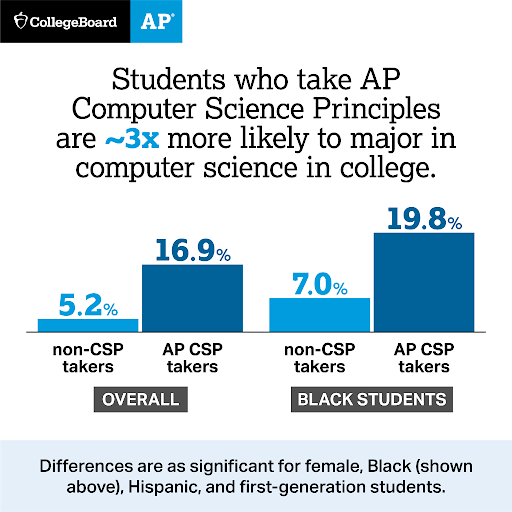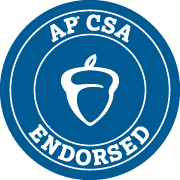
You might think of Tynker as the best place to begin your young child’s computer science journey, with our classic block-coding courses like Mind Crafters, Candy Quest, or Barbie: You Can Be Anything!
But we know how important it is to provide your students with a place to grow. That’s why Tynker is happy to announce two exciting Advanced Placement® courses, suitable for high-schoolers and other motivated learners:
Tynker’s AP Computer Science Principles, exploring the Python programming language.
Tynker’s AP Computer Science A, a rigorous introduction to the Java programming language.
Both new curricula have been endorsed by the College Board, the not-for-profit organization that connects students to college success at over 6,000 member institutions. For those new to Advanced Placement (AP) courses, these are courses recognized by universities as being college level. Students successfully passing an AP exam are awarded college credit by many, but not all, universities.
Table of Contents
AP Computer Science Principles

AP Computer Science Principles, sometimes called AP CSP, is a survey course exploring programming and key computational ideas, with the goal of broadening student participation in computer science.
- Language: Python and pseudocode
- Suitable for: Absolute beginners, anyone curious about code and computers — typically Grade 9 and above
- Aligned to: College Board’s AP Computer Science Principles (AP CSP)
- Course Length: One year
- Prerequisite: Algebra I
College Board’s Computer Science Principles program has been remarkably successful, with over one-hundred-thousand students participating each year. The framework has been also successful in encouraging students to continue their learning journey: Students who take an AP Computer Science Principles course are ~3x more likely to major in computer science in college.

Tynker’s Computer Science Principles course is a teacher-friendly, self-guided, no-installation-required introduction to the basics of computer science using Python, the most popular language taught in collegiate classrooms. Students learn about the Big Ideas of computer science, including abstraction, data, algorithms, and creative development.
Along the way, students complete engaging challenges like these:
- Movement Puzzles for the Basics: Simple puzzles reinforce Python syntax

- Creative Coding Challenges: Open-ended coding prompts provide students with the opportunity to collaborate and learn together

- Who Is Smarter? You … or the Program You Wrote? Students are challenged to program the “computer opponent” for simple logic games, like Rock, Paper, Scissors and The Game of Stones:

- A First Step Towards Data Science: Students analyze and visualize data using Python’s charting libraries

More than learning a single programming language or memorizing arbitrary syntax, students get the bigger picture. Students also read, research, and reflect.
- Students research computing innovations, computing’s impact on society, and more.
- Students prepare for the AP Exam — and ace it.
- Besides taking the AP exam, students must write their own original program and submit it for grading. Get some serious practice before submitting your work—then get guided, step-by-step advice on your graded submission.
AP Computer Science A

AP Computer Science A is the College Board’s classic yearlong course exploring Java, a language that’s widely used in the high-tech industry and collegiate introductory CS courses.
- Language: Java
- Suitable for: Any academically prepared students who have completed Algebra 1. Previous programming experience is helpful, but it is emphatically not required. Often taken in Grades 10-12.
- Aligned to: College Board’s AP Computer Science A (AP CS A)
- Course Length: One year
- Prerequisite: Algebra I
In this exciting class on Tynker, students explore problem-solving, design strategies and methodologies, data structures, approaches to processing data including some classic algorithms, analysis of potential solutions, and the ethical and social implications of computing.
Of course, at Tynker, we know that getting started coding can be hard, especially for first-timers. And Computer Science A has a reputation for being a seriously demanding course. Engaging, visual examples, as well as creative coding challenges in Tynker’s unique Computer Science A course keep things exciting:
- Movement Puzzles for the Basics: Simple puzzles help students get familiar with Java syntax.

- Code Stepper: Watch How the Computer Runs Code. Students watch line-by-line execution of their code to understand exactly how the computer works.

- Canvas Drawing Puzzles. Students learn about object-oriented programming fundamentals by drawing colorful shapes on a canvas.

- Visualize Famous Algorithms. Videos and hands-on coding exercises introduce classic algorithms like Insertion Sort, Binary Search, Selection Sort, and Merge Sort.

And of course, hands-on Coding Labs will have students writing their own seriously cool projects:
- Practice working with multidimensional arrays by creating a simplified version of the addictive logic game, 2048.
- Analyze the sentiment of online reviews of consumer products, using a list of terms provided. Then “bend the rules” and explore how you could use Java code to generate fake reviews.
- Learn how to represent music and create a randomly-generated “magnum opus” using Java’s Jmusic library.
- Put yourself in the shoes of a data scientist. Analyze trends in nutritional data, then explore patterns in your city’s weather data.
Professional Development
Supporting educators with robust professional development is a cornerstone of all endorsed AP curricula. Tynker’s AP CS Principles and AP CS A are no exception.
Dates and other details for additional AP CS A and AP CS Principles training sessions this summer will be announced soon.
Other Advanced Courses on Tynker
These two AP courses are only the latest addition to Tynker’s high school level courses. Take a look at what else we’re offering!
- Intro to Programming and Art – Using JavaScript and p5.js code, draw on a digital canvas, create Snapchat-style photo filters, make games, and much much more.
- JavaScript 1 – Learn to code fun browser-based games using JavaScript and HTML canvas. Build 11 mini-games like Snake and Pong!
- Intro to Web Development – Learn to create responsive web pages using HTML and CSS
- Python 1 – Learn to code browser-based games using Python, pen drawing, and Turtle graphics.
- Python 2 – Learn to solve real-world problems with a fast-paced introduction to Python.
Note: AP® and Advanced Placement® are registered trademarks of the College Board. Used with permission.



